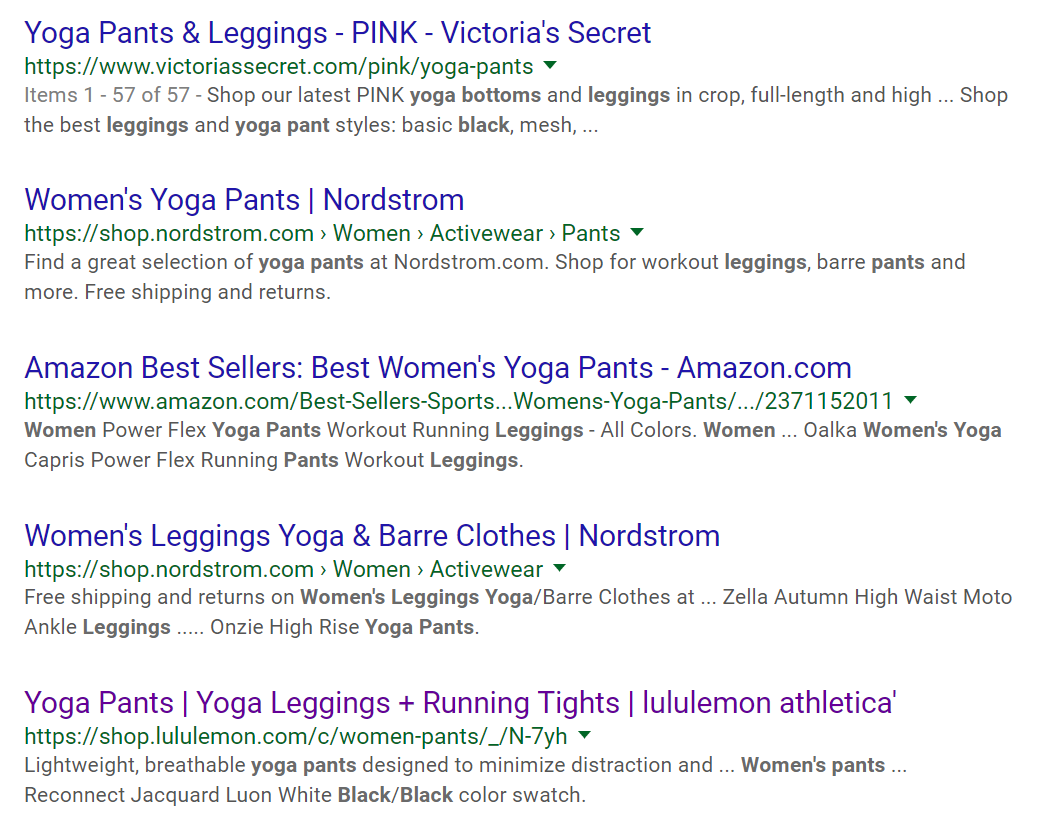Competitor research – learning about the businesses trying to capture the same customers and market as your company – is an invaluable part of developing your ecommerce success strategy.
But for many brands with an ecommerce presence, their competitors aren’t who they think they are.
Most businesses are aware of their industry competitors: brands with similar positioning, offerings and prices. Since search engines drive 37.5% eCommerce traffic, forward-thinking brands need to be aware of and design a strategy to adapt to a new challenger: the SEO competitor.
Let’s take a deeper look at the difference between industry competitors and SEO competitors. Then we’ll dive into the ways your SEO competitors can help improve your organic traffic and sales.
What is the difference between industry competitors and SEO competitors?
Industry competitors produce similar products within an industry, but differentiate themselves with branding and pricing, not product line offerings. Some use positioning and pricing that appeals to savvy bargain shoppers who love the thrill of the hunt, while others draw in luxury shoppers with messaging and price points that promote exclusivity.
Examples of industry competitors include Walmart and Target, J. Crew and Banana Republic, PetSmart and Petco, along with Lululemon and Athleta.
SEO competitors are the businesses that show up in search results for your top keywords.
These companies are competing on a product and information level, not a branding or pricing level. They may not be in the same industry as you, or even selling similar products. However, they are still ranking for the keywords your website aspires to rank for.
For example, the company SnackNation ranks for the keyword “team building activities” with their 81 Team Building Activities For Work blog post:

However, SnackNation is not a team building company. Rather, they service companies by providing offices and teams with curated snack boxes. So, while SnackNation may not be an industry competitor for team building event companies, they are an SEO competitor because their site ranks for highly valuable “team building” keywords.
How Do You Find SEO Competitors?
Depending on your product, you could have many different SEO competitors. And they may not be the same as your industry competitors.
Echoing the example above, all it takes to figure out who your SEO competitors are is a quick Google search of the terms you want your products to rank for.
For instance, Lululemon might be targeting the keyword “women’s black yoga legging pants sheer” to help their leggings rank better. By searching that keyword they can see which sites are ranking above and below them.


Notice the results. Athleta, an industry competitor, isn’t even featured in the top results. But Victoria’s Secret, Nordstrom, and Amazon are. These are the SEO competitors for Lululemon or any brand that’s trying to target the keyword “women’s black yoga legging pants sheer“.
So, how can this knowledge help improve your company’s organic traffic and sales?
How to Analyze & Overtake Your Competitors’ SEO Strategies
Identifying your SEO competitors and analyzing the strategies they’re using to attract visitors to their sites is crucial for the long-term success of your business. SEO competitor analysis provides data-backed insights about what’s working for similar websites, so you can funnel your resources into tactics that earn more organic traffic.
1. Find new ways to speak your customer’s language
Keywords are the cornerstone of a successful SEO strategy so it’s worthwhile to see what keywords your SEO competitors are targeting and how they’ve incorporated them into their product and collection pages. Use softwares like Ahrefs and SEMrush to discover a list of keywords that your competitors’ pages rank for.
Not only can you uncover some valuable insights on how your target audience is searching for products, it’s a great opportunity to see how other businesses have optimized their page. Are the keywords relevant to the product description? Do they highlight any trends in how people are searching for a product?
Don’t stop your competitor research efforts at their keyword optimization strategies. Look at the keywords your competitors are targeting in their paid campaigns for ideas on traffic-generating content to create around those topics.After all, if a competitor is investing in a PPC ad, there’s probably value in the keywords they’re targeting. By creating relevant, high-quality content around those topics, you can drive more visitors to your site through organic search.
2. Brainstorm better content ideas
Want to build quality content that drives visitors to your site, but not sure where to start? Look to your competitors for inspiration.Examining your competitors’ content can be the perfect way to jumpstart your creative process. Whether you’ve been on a regular publishing schedule for years or are just getting started with content marketing, it can be tricky to come up with fresh, relevant ideas on a consistent basis.
Consider these questions:Did they leave something out or miss an interesting angle? Is there a way to repackage the idea in a different format – think look books, micro videos, how-to posts and beyond? How can you take their idea and do it better?
Steer clear of copying competitor content but DO use it to brainstorm a starting point for your next round of content.
3. Identify link building opportunities
Wish you could get your hands on the competition’s SEO strategy? With backlink analysis, you practically can.Analyzing the sites that are linking to your competitors shows you the quantity and quality of their link building efforts, giving you an idea of where and how you can outshine them.
If your competitors are relying on a large number of backlinks on questionable sites, that leaves space for you to leapfrog them with quality link building on high authority sites – think guest posts, influencer mentions, etc.
And if your competitors are building high quality links, they’ve already done the legwork for you. Use the sites that are linking to them to find ‘mirror’ backlink opportunities – similar types of sites with similar audiences – or if the site has featured several of your competitors, consider reaching out to them to find out how your company can earn a backlink.
4. Build relationships with the right influencers
According to Shopify, 61% of consumers trust influencer recommendations.
That’s why the most powerful place to reach your target audience isn’t always through your platforms – it’s through the platforms of people they trust, aka ‘influencers.’
Influencers have built a name, reputation and following based on the ideas and products they embrace and promote. A partnership with a handful of carefully selected influencers could get you in front of thousands of your ideal customers.As with the content ideas and link building opportunities, if you’re not sure where to find the best influencers for your brand, just do some SEO competitor research. Who have they partnered with? Does it make sense to connect with them? Or are there similar influencers you can reach out to?
Keep Up With Your SEO Competitors
The online world is constantly shifting. That’s why we believe SEO competitor analysis isn’t a one-time step when mapping out your SEO and digital marketing strategy. You should be completing SEO competitor research on a regular basis—at Fire&Spark, we do a quarterly review for all of our clients, and monthly reviews for those in faster-changing areas of ecommerce.
Always approach your SEO competitor research with a detective’s mindset. Just because your competitor is publishing a certain type of content or partnering with a particular influencer doesn’t mean it’s a successful strategy that’s earning organic traffic and sales.
By identifying and researching the strategies your SEO competitors are using to perform well in organic search, your brand will be better positioned to adapt to changes and step into opportunities.
If you need help integrating competitor research into your SEO strategy, check out our expert eCommerce SEO services.

